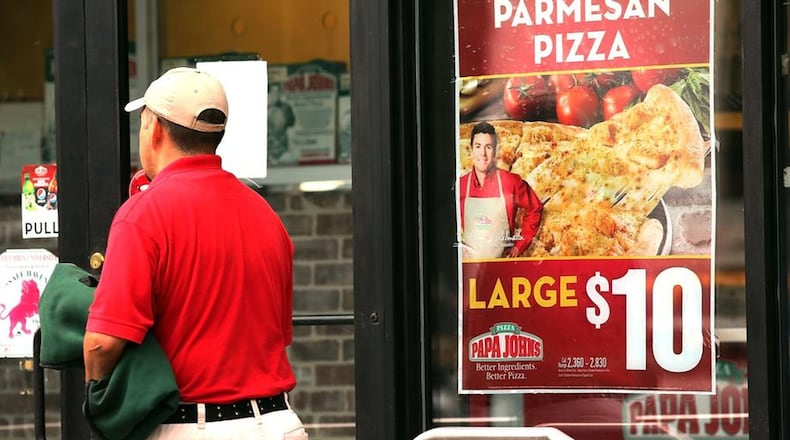Among the defendants named include Doug Pak, who owns Serazen LLC, a company that operates 73 Papa John’s stores, including 27 in the Dayton and Cincinnati areas.
FOLLOW: Mark Gokavi on Twitter and Facebook
The complaint filed in Dayton’s U.S. District Court said that delivery drivers get more than $8 per hour when working in the stores, but that number drops to about $4.50 when they act as delivery drivers.
The three drivers – who have been joined by a fourth plaintiff in what they hope is a class-action lawsuit – said the $1.25 per delivery doesn’t cover the difference, especially when gas, insurance, maintenance, wear and tear and GPS/cell phone services are factored.
The suit alleges that Papa John’s has “failed to take reasonable steps to ensure delivery drivers received adequate reimbursement for their automobile and other job-related expenses.”
MORE: Bengals settle federal wage lawsuit with ex-Ben-Gals
The Hatmakers both worked at Papa John’s Brandt Pike location in Huber Heights, while Peyton works at the chain’s Airway Road location in Dayton, according to the suit.
The suit said Papa John’s delivery drivers are required to maintain and pay for operable, safe and legally compliant automobiles and that in 2016, Papa John’s required drivers to track how many miles they drove but did not reimburse drivers for those miles.
The suit said that, according to the Internal Revenue Service, the standard mileage rate for the use of a car during the relevant time periods has dropped from 56 cents per mile in 2014 to 53.5 cents in 2017.
“Defendants’ managers at times also clock delivery drivers out onto their lower, ‘delivery pay rate’ before a delivery order is ready to go out the door and while the delivery drivers are still completing tasks inside the store,” the suit alleged.
The court documents filed include declarations and earning statements from all three plaintiffs, articles about massive restaurant chains and an example of emails sent to prospective class action lawsuit members.
“Defendants are aware or should have been aware that federal law required them to reimburse delivery workers for expenses relating to ‘tools of the trade,’ such as, among other things, automobile costs and gasoline for delivery drivers,” the lawsuit said. “Defendants’ unlawful conduct has been widespread, repeated, and consistent.”
About the Author
